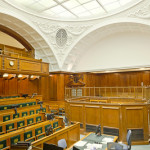
Sexual past should not factor in to rape trials, says law body
Under plans being considered by the Law Commission to combat plunging conviction rates, restrictions may be introduced to prevent rape complainants' sexual past being cross-examined in courts.
Rape convictions have fallen to a record low, with fewer than one in 50 offences leading to a charge. As part of an investigation into how evidence is used in rape trials and whether measures could be introduced to counter "rape myths", the commission wants to ensure that only "relevant" personal information is aired and will debate whether limits should be placed on the use of counselling and medical records in such trials.
One proposal being considered could see prosecutors deploy experts in court to dispel juries' "misconceptions" about rape - such as why the victim might have delayed reporting the sex attack, or failure to fight back when raped. Currently, prosecutors are not permitted to rely on expert evidence unless the court considers it necessary where the issue is deemed to fall outside the scope of a jury's understanding. In general in such trials, courts have held that jurors do not need experts as most issues are within their collective experience and understanding.
The proposed changes reflect a shift towards an "offender-centric approach", where police and prosecutors would focus on the actions and behaviour of the alleged attacker rather than testing the credibility of the victim. Victims' groups say the trauma of facing a court and potentially hostile questioning over their personal lives, has contributed to up to 65 per cent of rape victims withdrawing from prosecution. In five years, rape charging rates have dropped from 8.3 per cent to just 1.6 per cent, and the number of victims withdrawing their complaint has doubled to 60 per cent - largely due to intrusive police investigations into their digital communications, lengthy court delays, and the trauma of reliving attacks in court.
Updated for the first time in eight years, the guidelines for Crown Prosecution Service (CPS) lawyers include warnings that the "way a person is dressed", "flirtatious behaviour" or "simply the act of going back to someone's house" should not imply consent. The CPS advice also takes into account the huge increase in digital communications and warns that the sharing of explicit selfies and the use of dating apps do not make sex inevitable. Rape should also not be ruled out if someone is so drunk that they cannot give consent, just as it would be wrong to assume that alcohol consumption may make their evidence "unreliable".
The Johnson Partnership
Nottingham Solicitors
Nottingham Solicitors
A difficult subject for all. You may have been accused of a motoring crime or a more serious matter such as burglary or assault.
You are entitled to and can expect expert legal support on a confidential basis.
Please call today to discuss your legal needs and the availability of legal aid.
Long Row,
Nottingham,
NG1 6JE
01159 419141
32-34 Rosemary St,
Mansfield,
Nottingham,
NG18 1QL
01623 427575






